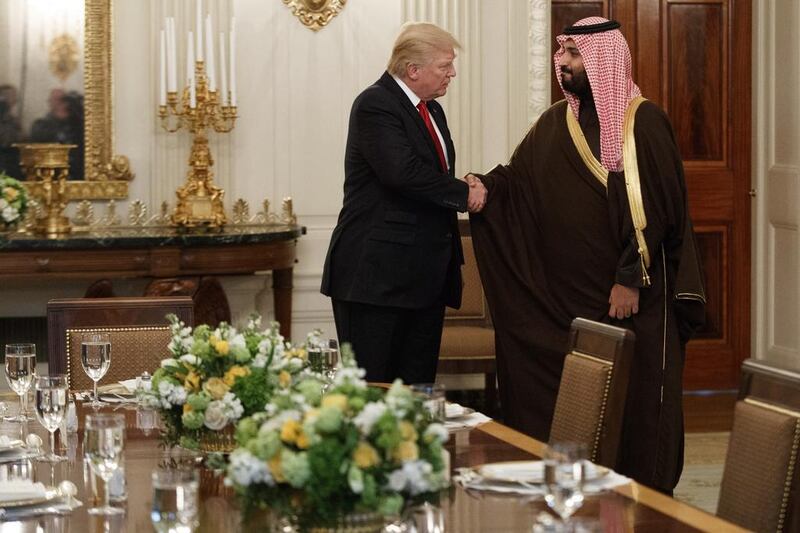Throughout the 1990s, the dynamics of the relationship between the United States and the Gulf remained relatively constant. The countries of the Gulf Cooperation Council relied heavily on the US for their security even as they received arms and support for their military operations.
The relationship’s dynamics changed under Barack Obama due to a combination of a different American approach to the Middle East and the chaos that followed the Arab uprisings in 2011. The change was not so much that the US showed less commitment to its partners – in many respects, commitment to the Gulf’s security increased. But, for the first time, the Gulf states found themselves compelled to utilise their military and political prowess.
So even though the previous administration was out of sync strategically on some issues, the Gulf states will not begin from a below-credit status as they seek to mend ties under the presidency of Donald Trump. On the contrary, improvement of their relationship with the US today will have a double effect: an end to any tension between the two sides that defined the Obama years will not merely bring the relationship back to its previous setting, rather, it will build on the hard lessons the main powers in the Gulf have gone through over the past few years.
This is exactly what makes the visit by Sheikh Mohammed bin Zayed, Crown Prince of Abu Dhabi and Deputy Supreme Commander of the Armed Forces, particularly notable. The UAE and the other Gulf countries now have a window wide open in the White House to reset ties and to take their alliance with the US to a new level, whereby they could pursue a more prudent and independent foreign policy in a region beset with turmoil and an interventionist Iranian approach.
Whether the Gulf states will be able to effectively utilise the opening offered to them in Washington remains to be seen. But the opening allows them to become less reliant on the US and able to contribute independently and assertively to the stability of the region.
The window of opportunity may not remain open. Indeed, officials within the Trump White House have already begun to echo the sentiments that defined the Obama presidency. For example, a senior official has said that the problem with the Sunni states is that they lack the ability to organise themselves and are not fully reliable.
Despite the Trump administration’s apparently genuine desire to work with the Gulf, it is not a given that Washington will always have the same position if its Gulf partners prove ineffective and without a plan. Although the US-Gulf relationship is unlikely to relapse, a policy divergence in certain cases can be a real possibility.
The US administration's policies in Syria and Iraq show that previous remarks about countering Iran are nothing more than rhetorical soundbites. If anything, those policies have served Iranian interests, be it the support for the Iran-Russia campaign against ISIL in Raqqa or the backing of a Kurdish organisation in northern Syria that is willing to hand over territory to the regime. The regime does not hide its excitement about the US support to the People’s Protection Units, the Kurdish militia better known as the YPG, against ISIL.
In this sense, the Gulf states should learn from how the US acted against Turkey’s interests and demands when it authorised the arming of the YPG last week. There is no question that the Trump administration sought – sincerely, some might say – to come up with an alternative plan to the one presented by the previous administration to extricate ISIL from Raqqa. But the US had to adopt the Obama plan, largely because Turkey failed to present a strategy the US could stand behind.
The main Gulf powers have made no secret of their excitement about the new US administration, and Mr Trump has likewise signalled that that alliance will be significantly deepened. Mr Trump’s first overseas visit will be to Saudi Arabia. In Riyadh, the Trump administration will also boost the Saudi political standing with the role of gathering representatives of Arab and Islamic countries to lead an effort to stabilise the region and counter Iran.
The US-Gulf relationship has already broken new grounds, comparative to the previous administration. In Yemen, Gulf officials say collaboration between the US and the Saudi-led coalition exponentially increased. In Libya, they hope that the new administration will break away from the old policy of focusing on what some in the Gulf view as crippling consensus politics.
For the Gulf, Mr Trump ticks many boxes. There might be a new level of cooperation unseen since the 1990s. But that hinges largely on whether the Gulf states recognise that the US does not have a magic plan to stabilise the region or the capacity to play a long-term role.
What the US has is the willingness and appetite to listen to alternative plans. For the Gulf states, this is the time to come up with a comprehensive regional plan that the US could help put in motion.
Hassan Hassan is a senior fellow at the Tahrir Institute for Middle East Policy and co-author of ISIS: Inside the Army of Terror
On Twitter: @hxhassan





